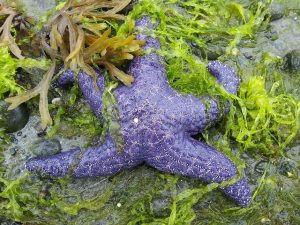Entrepreneurial Altruism Save One Starfish
Entrepreneurial Altruism—Save One Starfish:  One day a man was walking along the beach when he noticed a boy picking something up and gently throwing it into the ocean. Approaching the boy, he asked, “What are you doing?” The youth replied, “Throwing starfish back into the ocean. The surf is up and the tide is going out. If I don’t throw them back, they’ll die.” “Son,” the man said, “don’t you realize there are miles and miles of beach and hundreds of starfish? You can’t make a difference!”
One day a man was walking along the beach when he noticed a boy picking something up and gently throwing it into the ocean. Approaching the boy, he asked, “What are you doing?” The youth replied, “Throwing starfish back into the ocean. The surf is up and the tide is going out. If I don’t throw them back, they’ll die.” “Son,” the man said, “don’t you realize there are miles and miles of beach and hundreds of starfish? You can’t make a difference!”
After listening politely, the boy bent down, picked up another starfish, and threw it back into the surf. Then, smiling at the man, he said…” I made a difference for that one.”This widely quoted anecdote is attributed to Loren Eiseley, who was an American anthropologist.
Can One Startup Make a Difference?
“I can’t make a difference. All I can do is to stay in business.” An entrepreneur faces daunting odds, as I can attest, but if she passionately pursues the purpose of her startup and only achieves one outcome that serves that purpose, it will have been worth the slog, quite apart from any revenue or employment that she creates. Successful startup purposes will be altruistic more than selfish. Successful startup purposes will be altruistic more than selfish. Save one starfish at a time.
If you don’t believe that one person can make a positive difference, reflect on an example of the obverse. Many giant corporations will reward the CEO with thousands of dollars if his company increases its share price by x per cent in a year. It benefits to the world not at all, and might involve the reverse—through a negative downstream impact such as pollution. Indeed it’s likely to create a dis-benefit.
Startups that make even a single positive difference:
- influence others to follow their passion;
- learn from their experience to go further;
- increase confidence in their purpose;
- put their purpose into action from the start;
- provide leadership to hesitant entrepreneurs.
The Earth is Patagonia’s Only Shareholder
Yvon Chouinard, Patagonia’s founder, has thrown many a starfish back into the surf. Right from the get-go, his company was committed to using the company to change the way business was done. They started with their products, using materials that caused less harm to the environment. Twelve years later, they started to give away 1% of sales each year. They became a certified B Corp and a California benefit corporation in 2012 , writing their values into Patagonia’s corporate charter so they would be preserved. More recently, in 2018, they changed the company’s purpose to, “We’re in business to save our home planet.”
In late 2022, the Chouinard family transferred all ownership to two new entities: Patagonia Purpose Trust and the Holdfast Collective. Every dollar that is not reinvested back into Patagonia is distributed as dividends to protect the planet.
The Patagonia Purpose Trust now owns all the voting stock of the company (two percent) and exists to create a more permanent legal structure to enshrine Patagonia’s purpose and values. It aims to help ensure that there is never deviation from the intent of the Chouinard family.
The Holdfast Collective owns all the nonvoting stock (98 percent), and it will use every dollar received from Patagonia to protect nature and biodiversity, support thriving communities and fight the environmental crisis. Each year, profits not reinvested back into the business will be distributed by Patagonia as a dividend to the Holdfast Collective to help fight the climate crisis—maybe as much as $100 million, depending on the company’s performance.
That’s quite a lot of starfish that Chouinard has thrown back into the sea since the first one, in the 50 years since he started Patagonia, but this last one was supersized. He says the company has ales of over $1 billion and profits of some $100 million. “Instead of extracting value from nature and transforming it into wealth, we are using the wealth Patagonia creates to protect the source. “We’re making Earth our only shareholder. I am dead serious about saving this planet,” he told NPR, when announcing the new stock ownership.
Starfish or Selfish?
There are many lesser, but significant generous ‘starfish’ acts by entrepreneurs all the time. They are in stark contrast to the ‘selfish’ acts of established companies that receive wide publicity in the financial press. Here are four blatantly selfish acts that serve as examples:
- stock buybacks;
- stock price related bonuses;
- extreme CEO to worker pay ratios;
- pollution as a negative externality.
You will know about or have experienced many other examples. A startup that can ‘throw one starfish back into the ocean’ by an action with purpose to make the world a better place, will have made a difference. At the simplest level, a company person who reacts to positively to a customer issue, has thrown a starfish; when PayPal found that 60% of its hourly workers and call center employees struggled to pay their bills at the end of month, CEO Dan Schulman committed to raising the basic wages of the most affected workers, while also reducing the cost of healthcare for them by an average of about 60%, he had thrown a starfish.
Reell Manufacturing is one of the cases that Bo Burlingham researched for his book, Small Giants. Since its founding in 1970, the company has been committed to serving the common good, striving to build hope in the world by changing lives for the better through both financial aid and service to their communities. Each year Reell gives 10 per cent of its pre-tax profits to local and global communities. When they are blessed with profits they give back. Reell also provides opportunities for coworkers to serve in both the local and global communities.
To me it’s interesting that the company I co-founded in 1982, also did exactly the same and at that time we knew of no other company doing that. I do not think that there’s been any research on the matter, but my deep suspicion is that this kind of ‘starfish’ saving (companies giving 10 per cent of profits) exists in many other places, especially among new entrepreneurs.
Growth of Entrepreneurial Altruism
Young entrepreneurs are more altruistic than older entrepreneurs. According to the UK’s CapX, they are twice as likely (39 vs 18 per cent) to say that their business’ primary aim is to solve a social or environmental problem. Interestingly, that figure actually rises to 47 per cent for the most successful entrepreneurs (founders of businesses with a turnover of over £1m).
There is a Chinese saying: “If you want happiness for an hour, take a nap. If you want happiness for a day, go fishing. If you want happiness for a year, inherit a fortune. If you want happiness for a lifetime, help somebody.” For centuries, the greatest thinkers have suggested the same thing: Happiness is found in giving.
Starfish Saving Entrepreneurship
You can explore more ideas on how to create a new venture that prosper through actions committed to people as much as profits here:
- Rewriting the Rules of Business;
- Startup to Flourish;
- Flourish Honorably;
- Startup Purpose;
- Practice Makes Purpose;
- Startup Consciously.






